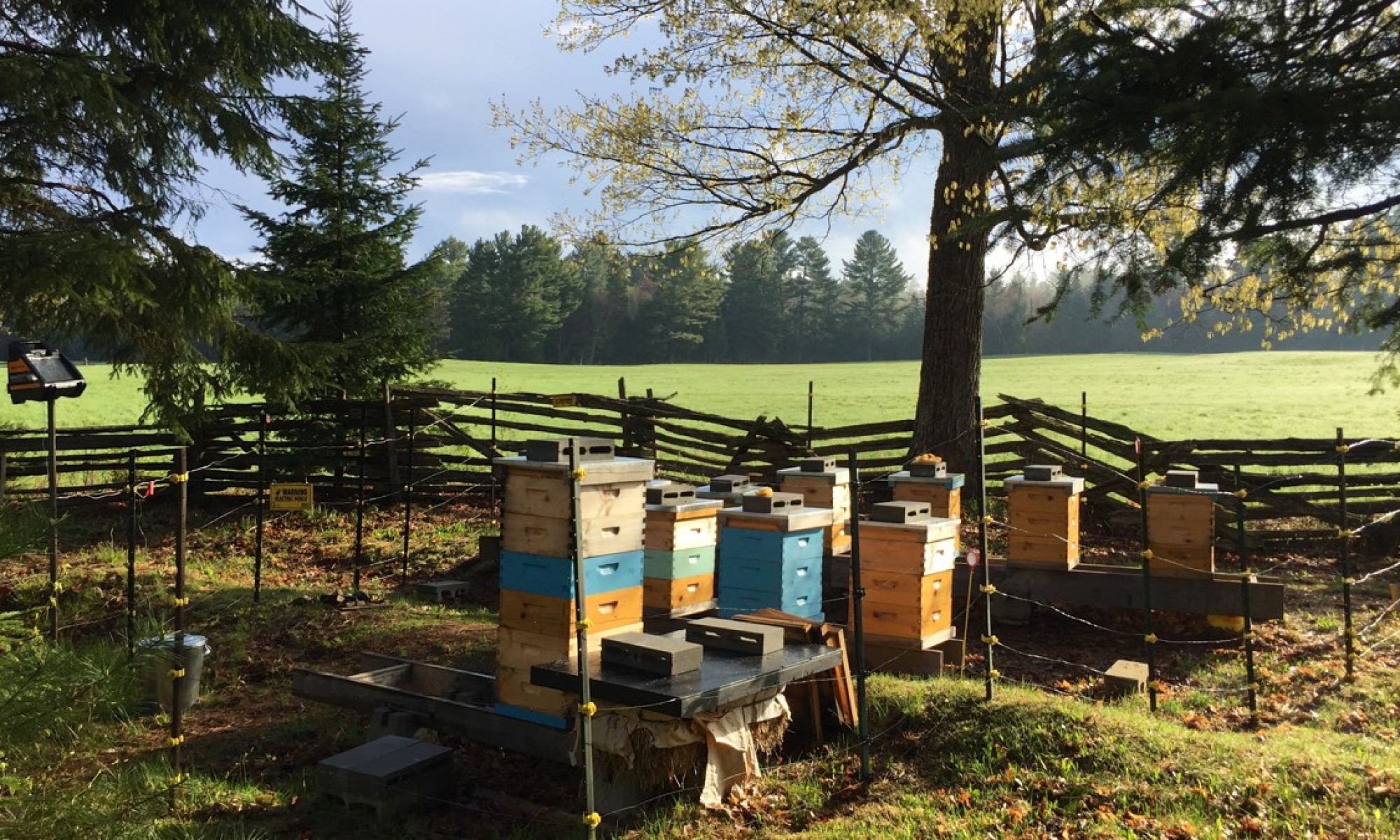Muskoka/Parry Sound Beekeepers Association
Sept. 7th, 2018
Melanie Kempfer from the Tech Transfer Team does is our speaker. These are the highlight from her talk.
Projects this summer of 2018 ….
*TTT of 5 had 2 summer students this year
*Yard in Muskoka is being used to study, Beeomics. Good genetics for bees that are gentle, winter hardy, viable, healthy etc. This yard is isolated making it perfect for this type of study.
*U of G – Testing prebiotics (similar to probiotics that humans may use). Prebiotics promote good gut health for the bees. May be added to pollen paddies for treating nosema and chalk brood as an alternative to fumagilin (which we can’t get anymore). Or don’t treat and it eventually gets better. Nosema is caused in times of stress for the bees. Minimize stress!
*Queen Banking. Local bees are the best as transporting bees means a reduction of sperm viability. Tracheal mites can also be a problem in imported bees, not as much in local bees.
The TTT has also purchased some infra red light guns to see what the bee cluster is doing in the hive during winter. Great for winter monitoring.
*VSH – Varroa Sensitive Hygiene. Only in Quebec for varroa.
*Grooming Behaviour – Testing for this behavior in bees as it keeps varroa mites low.
*Mid-Season Treatment? Spring and fall is our typical time to treat for mites but varroa are at their peak in summer when it’s difficult or impossible to treat due to honey supers. Bees have a peak in their population but varroa don’t! Varroa increase in the fall, especially in July and August. The TTT is testing a new Oxcilic acid glycerin strip that the bees chew and it helps to break down the mite population (42 days). It’s just being tested now and must be tested for 3 years to be available to beekeepers. 142 colonies are in the test trial.
*Breeding Program – 22 Breeders.
Programs offered by TTT this year of 2018 ….
* Workshops
* Advanced Workshops in winter
*Online Workshops (intro and IPM)
Legislation to suppress antibiotic use in animal husbandry/beekeeping has meant that Fumagilin B is not being produced anymore (treatment for nosema). Melanie says that nosema usually sorts itself out eventually.
Oxytet (treatment for foulbrood) will only be available for purchase from vets as of Dec. 1st, 2018. Suggested that we find ‘bee friendly’ vets. It was also suggested we might want to come up with a list of access to these vets.
Small Hive Beatle – found in Niagara. Mel says SHB doesn’t cause considerable damage. Honey will slim up if left too long but SHB won’t damage the bees.
Fall Management Questions?
*Did you monitor for mites?? We need winter bees! Mites decrease the chance for winter survival of bees.
*Did you take honey or leave honey supers on for fall flowers? Do lots of monitoring in fall.
*Colony Strength? Less than 8 frames of bees and they won’t likely survive the winter!
*Queen Status? Will your queen survive the winter? If you suspect not, this is the time to requeen. A new queen will survive the winter better and start in the spring with gusto!
*Feed Colonies – 2:1 sugar to water
*Treat for Varroa and AFB
*Wrap Colonies before the snow piles up.
Monitoring
*Sticky board – 3 day drop. Close backs completely.
*Alcohol Wash – ½ cup of bees taken from open brood frame for best results. Shake 2-3 frames of bees into a tub to take a broader sample.
*Ether Roll
*Sugar Dusting – Doesn’t kill bees but not as accurate as some of the other monitoring systems. Use starchless icing sugar.
Fall Feeding
*Feed before the bees cluster at +10 or less consistently.
*Pollen paddies aren’t required in fall as much as in spring.
Concerns?
*Winter Bees – “Fat Bees” vs “skinny bees”. Older bees have less fat on their bodies. You want healthy fat bees, enough bees.
*Balance room for feed/nectar vs health vs population.
*Protection – Use wraps and wind breaks! Wind knocks bees down very quickly!!
*Wraps – later in fall is ok but leave on well into spring. Temps should be above 0 degrees at night consistently (May/June). When it’s safe to plant tomatoes it’s safe to take your wraps off!
*Entrance Reducers? Entrance reducers can cause moisture build up. They are not as needed as we thought. Upper entrance is VERY important! 1”
Winter Considerations
*Winter protection – trees, shrubs, fencing against cold winds!
*Air Circulation
*Moisture
*Pests
Winter Wraps
*Hive top insulation – Styrofoam, wood shavings, straw
*Wraps – cardboard, tar paper, corrugated plastic, bee cozy, Ben Hogan wraps (like bubble wrap), winterizing boxes, Western wraps.
*things to consider – R-value, durability, storage, convenience, cost?
****************
Meeting Notes
*Rob Key (president) puts forward a motion to move our meeting nights to Wednesday nights? 2nd Wednesday of every month requested. Motion passed by majority.
*Advertising/ Getting known? Suggested that we look into a club business card and get sponsors to help with this. Mark makes a motion to look into this. 2nd by Heather Ferrier.
-Email list
-Logo – clip art?
*Mark would like to approach town for community apiary at the Heritage place. He will need to have clubs vote to support this. He will find out more and we may vote next meeting
*Roland make motion to close meeting at 8:45pm
